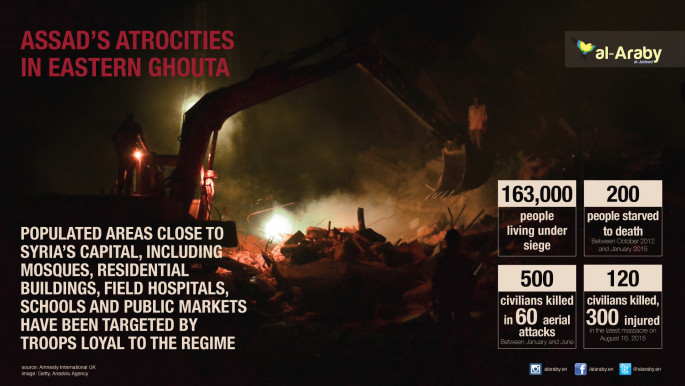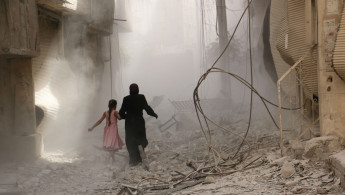Syrian regime bombs Douma despite ceasefire talks with rebels
A ceasefire between Syrian army forces and rebels in the Damascus suburbs has broken after regime aircraft hit the largely flattened town of Douma with cluster bombs causing enormous damage.
4 min read
Douma in the Damascus suburbs has been repeatedly bombarded by regime forces [Anadolu]
Syrian regime forces have again bombed the town of Douma in the Eastern Ghouta near Damascus on Thursday, using rockets reportedly laden with cluster bombs.
One fatality and more than a dozen injuries have been reported so far. Medical sources say the death toll is likely to rise.
Hassan Taqi al-Din, an activist in Douma, told al-Araby al-Jadeed's Arabic service said that the bombing targeted a residential neighbourhood in downtown Douma.
He said more than 10 rockets thought to be carrying cluster munitions landed in the city.
Taqi al-Din said that fighting continues on the outskirts of Douma between regime forces and rebels.
The new bombing suggests ceasefire talks reported earlier may have collapsed.
The two sides had been locked in talks overnight in the hopes of reaching a ceasefire deal.
This would be the first such agreement since new international efforts on ending Syria's conflict began in Vienna last month.
Yasser Doumani, activist on the ground, told al-Araby al-Jadeed's Arabic service that there were reports indicating the armed opposition factions in the Eastern Ghouta have tentatively agreed to a ceasefire with regime forces, effective at Thursday 6am local time.
A deal would also mark the first temporary truce in the Eastern Ghouta region east of the capital, which has been devastated by fighting since the outbreak of Syria's conflict in March 2011.
"They failed to reach an agreement on the ceasefire by this morning, but the negotiations are ongoing," said Rami Abdel Rahman, the head of the Syrian Observatory for Human Rights monitoring group.
The typically active fronts around the opposition-held towns of Douma and Harasta had been quiet on Thursday morning, he said, in an apparent gesture of good will.
Points of divergence included aid deliveries and the release of captives from President Bashar al-Assad's Alawite minority held by the powerful Jaish al-Islam rebel group, the Britain-based Observatory said.
"The negotiations have only started, and they may need days or weeks to bear results," a Syrian security source told AFP.
"We are open to any arrangement that stops the bloodletting," the source added.
A second security source told AFP that Russia, a key backer of Assad, was playing a mediating role in the negotiations by reaching out to "supporters" of armed groups in Eastern Ghouta.
However, the official spokesman for Jaish al-Islam, speaking to al-Araby al-Jadeed, denied a ceasefire had been reached, saying the efforts are still a "tentative initiative".
Pro-regime news outlets have also denied that a deal has been agreed:
The official spokesman said Jaish al-Islam is currently studying the proposal, stressing that the ceasefire would only cover the Eastern Ghouta.
Sources also told local Lebanese newspapers that Jordan is involved in the ceasefire talks.
On Wednesday, spokesman for the Jordanian government Mohammad Momani said his country is playing a "coordinating" role in putting together a list of terrorist groups in Syria, a task entrusted to the Hashemite kingdom during the last round of the Vienna Syria crisis talks.
Momani said Jordan is in contact with all countries concerned with the Syrian crisis to draft the list.
However, he pointed out that differences remain between these nations over the designation of terrorist organisations.
Momani said his country was chosen because of its stance in favour of a political settlement to the Syrian crisis, and its ties to both the Syrian regime and opposition.
On Sunday, Russian Foreign Minister Sergei Lavrov had said participants at talks in Vienna on Syria have agreed that Jordan will coordinate efforts to compile the list of terrorist groups in Syria.
"The work will be coordinated on supplementing the terrorist [groups] list, Jordan will be in charge of coordination," Lavrov told reporters on the sidelines of a G-20 summit of world leaders in the Turkish coastal province of Antalya.
The new list will not include the groups already identified by the UN.
One fatality and more than a dozen injuries have been reported so far. Medical sources say the death toll is likely to rise.
Hassan Taqi al-Din, an activist in Douma, told al-Araby al-Jadeed's Arabic service said that the bombing targeted a residential neighbourhood in downtown Douma.
He said more than 10 rockets thought to be carrying cluster munitions landed in the city.
|
|
| Activists said that Ghouta was hit with 12 cluster bombs |
Taqi al-Din said that fighting continues on the outskirts of Douma between regime forces and rebels.
The new bombing suggests ceasefire talks reported earlier may have collapsed.
The two sides had been locked in talks overnight in the hopes of reaching a ceasefire deal.
This would be the first such agreement since new international efforts on ending Syria's conflict began in Vienna last month.
Yasser Doumani, activist on the ground, told al-Araby al-Jadeed's Arabic service that there were reports indicating the armed opposition factions in the Eastern Ghouta have tentatively agreed to a ceasefire with regime forces, effective at Thursday 6am local time.
A deal would also mark the first temporary truce in the Eastern Ghouta region east of the capital, which has been devastated by fighting since the outbreak of Syria's conflict in March 2011.
"They failed to reach an agreement on the ceasefire by this morning, but the negotiations are ongoing," said Rami Abdel Rahman, the head of the Syrian Observatory for Human Rights monitoring group.
The typically active fronts around the opposition-held towns of Douma and Harasta had been quiet on Thursday morning, he said, in an apparent gesture of good will.
Points of divergence included aid deliveries and the release of captives from President Bashar al-Assad's Alawite minority held by the powerful Jaish al-Islam rebel group, the Britain-based Observatory said.
"The negotiations have only started, and they may need days or weeks to bear results," a Syrian security source told AFP.
"We are open to any arrangement that stops the bloodletting," the source added.
A second security source told AFP that Russia, a key backer of Assad, was playing a mediating role in the negotiations by reaching out to "supporters" of armed groups in Eastern Ghouta.
However, the official spokesman for Jaish al-Islam, speaking to al-Araby al-Jadeed, denied a ceasefire had been reached, saying the efforts are still a "tentative initiative".
Pro-regime news outlets have also denied that a deal has been agreed:
|
— SYRIA (@SY_R_I_A_N) November 19, 2015" style="color:#fff;" class="twitter-post-link" target="_blank">Twitter Post
|
The official spokesman said Jaish al-Islam is currently studying the proposal, stressing that the ceasefire would only cover the Eastern Ghouta.
 |
| [Click to enlarge] |
Jordan working on 'terrorist list'
Sources also told local Lebanese newspapers that Jordan is involved in the ceasefire talks.
On Wednesday, spokesman for the Jordanian government Mohammad Momani said his country is playing a "coordinating" role in putting together a list of terrorist groups in Syria, a task entrusted to the Hashemite kingdom during the last round of the Vienna Syria crisis talks.
Momani said Jordan is in contact with all countries concerned with the Syrian crisis to draft the list.
However, he pointed out that differences remain between these nations over the designation of terrorist organisations.
Momani said his country was chosen because of its stance in favour of a political settlement to the Syrian crisis, and its ties to both the Syrian regime and opposition.
On Sunday, Russian Foreign Minister Sergei Lavrov had said participants at talks in Vienna on Syria have agreed that Jordan will coordinate efforts to compile the list of terrorist groups in Syria.
"The work will be coordinated on supplementing the terrorist [groups] list, Jordan will be in charge of coordination," Lavrov told reporters on the sidelines of a G-20 summit of world leaders in the Turkish coastal province of Antalya.
The new list will not include the groups already identified by the UN.





 Follow the Middle East's top stories in English at The New Arab on Google News
Follow the Middle East's top stories in English at The New Arab on Google News
![Dozens of people turned out for the funerals [Getty]](/sites/default/files/styles/image_330x185/public/2024-11/GettyImages-2185229760.jpg?h=e7c891e8&itok=1bctDcE6)
![The UAE is widely suspected of arming the RSF militia [Getty]](/sites/default/files/styles/image_330x185/public/2024-11/GettyImages-472529908.jpg?h=69f2b9d0&itok=Yauw3YTG)
![Netanyahu furiously denounced the ICC [Getty]](/sites/default/files/styles/image_330x185/public/2024-11/GettyImages-2169352575.jpg?h=199d8c1f&itok=-vRiruf5)